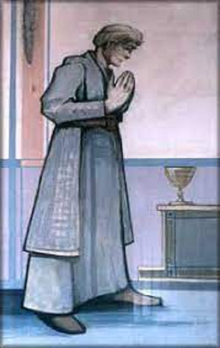
Gerard Manley Hopkins was an English poet and Jesuit priest, whose posthumous fame places him among the leading English poets. His prosody – notably his concept of sprung rhythm – established him as an innovator, as did his praise of God through vivid use of imagery and nature.
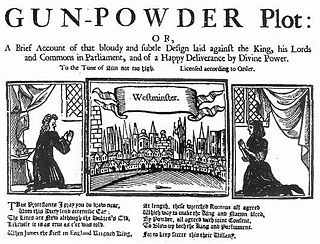
The Gunpowder Plot of 1605, in earlier centuries often called the Gunpowder Treason Plot or the Jesuit Treason, was an unsuccessful attempted regicide against King James I by a group of English Catholics led by Robert Catesby who considered their actions attempted tyrannicide and who sought regime change in England after decades of religious persecution.

John Fisher was an English Catholic bishop, cardinal, and theologian. Fisher was also an academic and Chancellor of the University of Cambridge. He is honoured as a martyr and saint by the Catholic Church.
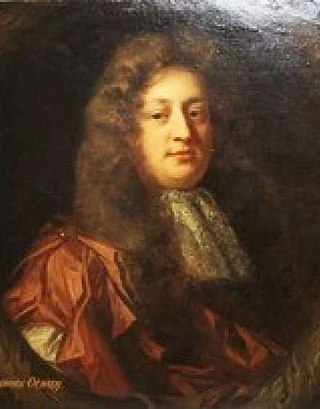
Thomas Otway was an English dramatist of the Restoration period, best known for Venice Preserv'd, or A Plot Discover'd (1682).

John Gerard was an English herbalist with a large garden in Holborn, now part of London. His 1,484-page illustrated Herball, or Generall Historie of Plantes, first published in 1597, became a popular gardening and herbal book in English in the 17th century. Except for some added plants from his own garden and from North America, Gerard's Herbal is largely a plagiarised English translation of Rembert Dodoens's 1554 herbal, itself highly popular in Dutch, Latin, French and other English translations. Gerard's Herball drawings of plants and the printer's woodcuts are mainly derived from Continental European sources, but there is an original title page with a copperplate engraving by William Rogers. Two decades after Gerard's death, the book was corrected and expanded to about 1,700 pages.

Heythrop College, University of London, was a constituent college of the University of London between 1971 and 2018, last located in Kensington Square, London. It comprised the university's specialist faculties of philosophy and theology with social sciences, offering undergraduate and postgraduate degree courses and five specialist institutes and centres to promote research.

Robert Wintour and Thomas Wintour, also spelt Winter, were members of the Gunpowder Plot, a failed conspiracy to assassinate King James I. Brothers, they were related to other conspirators, such as their cousin, Robert Catesby, and a half-brother, John Wintour, also joined them following the plot's failure. Thomas was an intelligent and educated man, fluent in several languages and trained as a lawyer, but chose instead to become a soldier, fighting for England in the Low Countries, France, and possibly in Central Europe. By 1600, however, he changed his mind and became a fervent Catholic. On several occasions he travelled to the continent and entreated Spain on behalf of England's oppressed Catholics, and suggested that with Spanish support a Catholic rebellion was likely.
A priest hole is a hiding place for a priest built in England or Wales during the period when Catholics were persecuted by law. Following the accession of Queen Elizabeth I to the throne in 1558, there were several Catholic plots designed to remove her, and severe measures, including torture and execution, were taken against Catholic priests. From the mid-1570s, hides were built into houses to conceal priests from priest hunters. Most of the hides that survive today are in country manor houses, but there is much documentary evidence, for example in the Autobiography and Narrative of the Gunpowder Plot of John Gerard, of hides in towns and cities, especially in London.

The Diocese of Rochester is a Latin Church diocese of the Catholic Church in the Upstate region of New York State in the United States.

Vincent Gerard Nichols is a British cardinal of the Roman Catholic Church, Archbishop of Westminster and President of the Catholic Bishops' Conference of England and Wales. He previously served as Archbishop of Birmingham from 2000 to 2009. He was created cardinal in 22 February 2014.
John Gerard was a priest of the Society of Jesus who operated a secret ministry of the underground Catholic Church in England during the Elizabethan era.
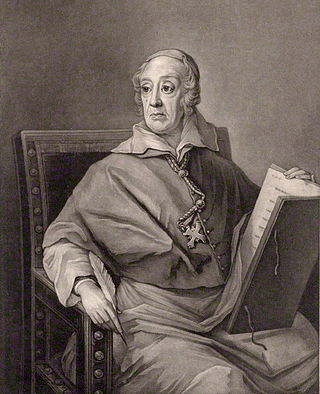
Bonaventure Giffard (1642–1734) was a Roman Catholic bishop who served as the Vicar Apostolic of the Midland District of England from 1687 to 1703 and Vicar Apostolic of the London District of England from 1703 to 1734.

Michael James Nazir-Ali is a Pakistani-born British Roman Catholic priest and former Anglican bishop. He served as the 106th Bishop of Rochester from 1994 to 2009 and, before that, as Bishop of Raiwind in Pakistan. He is currently the director of the Oxford Centre for Training, Research, Advocacy and Dialogue. In 2021, he was received into the Catholic Church and was ordained as a priest for the Ordinariate of Our Lady of Walsingham on 30 October 2021, one of several Anglican bishops who converted to Catholicism that year. In 2022, he was made a monsignor. He is a dual citizen of Pakistan and Britain.
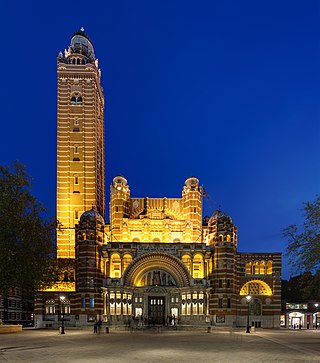
The Catholic Church in England and Wales is part of the worldwide Catholic Church in full communion with the Holy See. Its origins date from the 6th century, when Pope Gregory I through the Roman monk and Benedictine missionary, Augustine, later Augustine of Canterbury, intensified the evangelization of the Kingdom of Kent linking it to the Holy See in 597 AD.
A priest hunter was a person who, acting on behalf of the English and later British government, spied on or captured Catholic priests during Penal Times. Priest hunters were effectively bounty hunters. Some were volunteers, experienced soldiers or former spies.
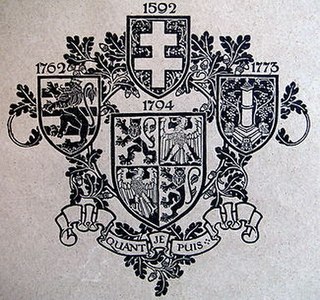
The Colleges of St Omer, Bruges and Liège were successive expatriate institutions for Roman Catholic higher education run by the Jesuits for English students.
Thomas Gerard (1500?–1540) was an English Protestant reformer. In 1540, he was burnt to death for heresy, along with William Jerome and Robert Barnes.
Sir Thomas Gerard, 1st Baronet was an English politician who sat in the House of Commons at various times between 1597 and 1621.
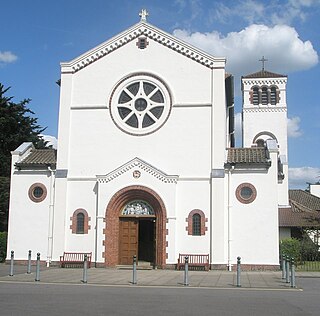
The Church of Our Lady of the Assumption is a Roman Catholic church in Englefield Green, Surrey. It is situated on St Cuthbert's Close and faces Harvest Road in the older side of the village close to Egham Hill. It was built from 1930 to 1931 and designed by Joseph Goldie. Although the church is not a listed building, English Heritage, in two separate reports, stated "this is a thumping great church" and "many churches were being built in the Romanesque style in the 1930s ... but Goldie's church is better composed and more competently detailed than most."

Gerard Eyre Wriothesley Noel was an English author, editor and aristocrat. He was the editor-in-chief of The Catholic Herald from 1982 to 1984 and wrote 20 books.
